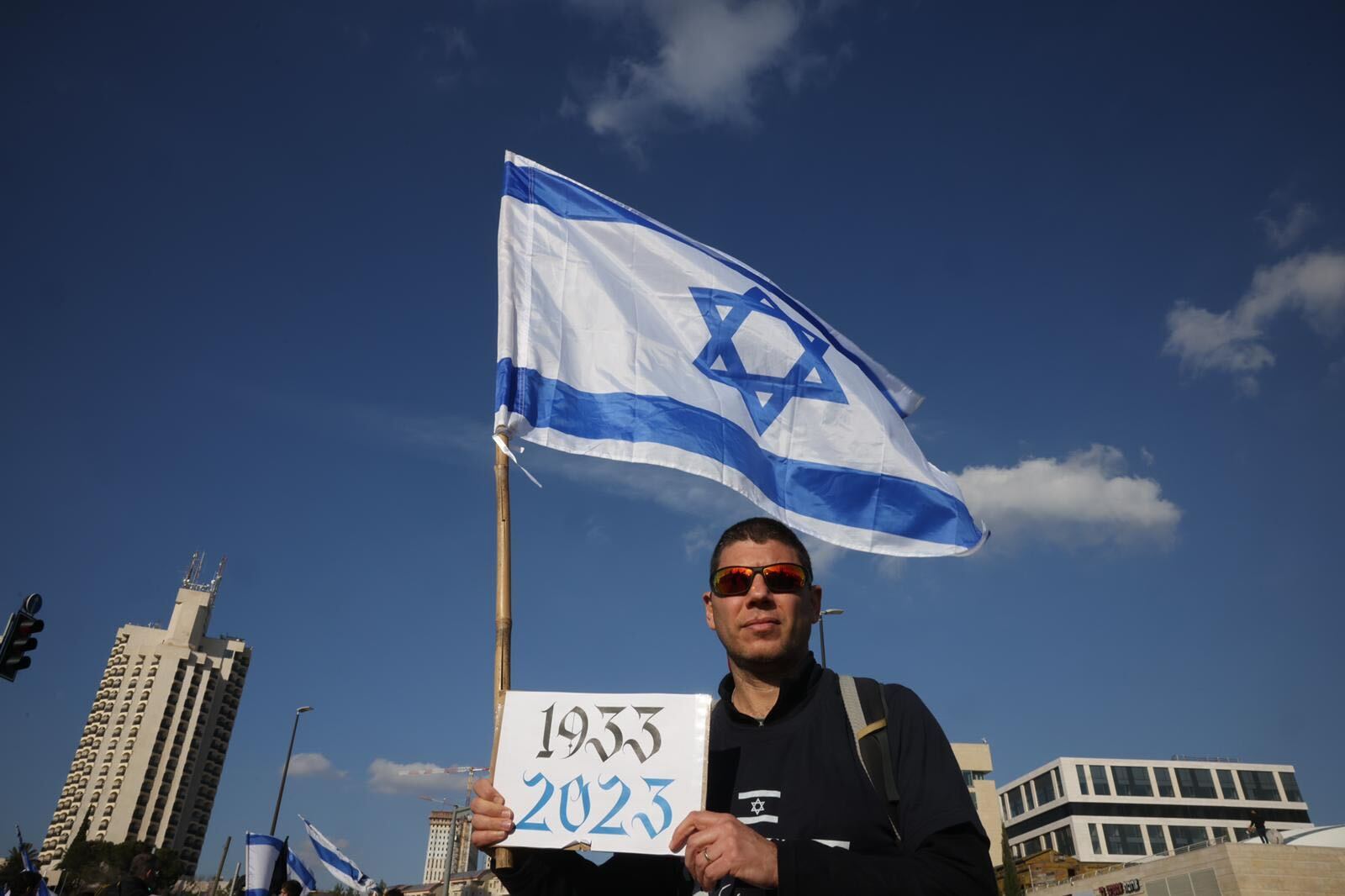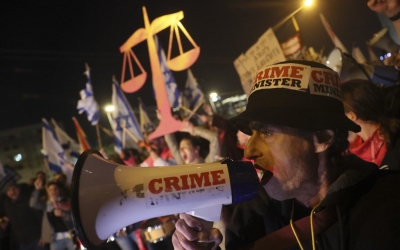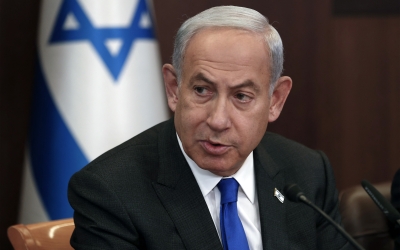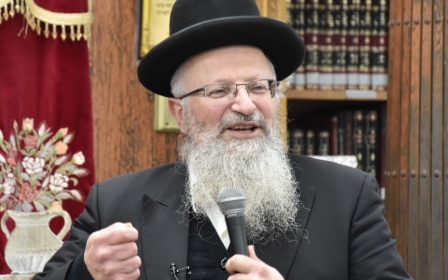Israel: 100,000 protest against controversial judicial overhaul

One hundred thousand Israelis protested across the country on Monday against the far-right government's controversial judicial overhaul, which critics say would neuter the Supreme Court and threaten the foundation of the country’s democracy.
The measures, which were approved by the Israeli parliament's legislative committee on Monday and will go to a vote in the Knesset in the coming days, have provoked widespread criticism and charges that they would give the legislative branch nearly unchecked authority.
Across the country, businesses closed and an estimated 100,000 people, including schoolchildren, took to the streets, in what Haaretz said was “set to be one of the largest demonstrations in Israeli history”.
More than 80,000 rallied outside the Knesset in Jerusalem. Protesters then walked through the city, blocking roads.
Stay informed with MEE's newsletters
Sign up to get the latest alerts, insights and analysis, starting with Turkey Unpacked
“We will shake the legs of this corrupt government,” Kema Bresler, founder of the Black Flags protest group, told the crowd, who chanted: “Democracy or rebellion.”
Anat, a protester in her 20s who went to the protest with her friends, told Middle East Eye: “I have come to keep Israel democratic.”
Demonstrators waved Israeli flags and placards that read "Save Israel democracy" and "The whole world is watching".
Another read: “1933 Germany. 2023 Israel? Biden, you can stop it!”
Dana Foss, holding the sign, told MEE: “If the laws are passed, it will be the beginning of the end of the state of Israel.
“In the end there will be a critical mass [of protesters] and they will realise that they cannot ignore us.”
Renana Amir, who came with her two elementary school children, said: “This is mainly for the future of the younger generation.”
The plan would give parliament the power to override Supreme Court decisions through a simple majority vote, and de facto control over court nominees, a role currently held by a mixed panel of politicians, judges and bar association members.
It would also limit the court’s ability to bar legislation that infringes on human and civil rights.
Israel has no constitution, and there is little separation between the executive and legislative branches, as governments nearly always hold a majority in the Knesset. This has historically meant the Supreme Court is the most effective check on government power.
Netanyahu and his allies say the reforms are necessary to correct a power imbalance between elected representatives and the nation's top court, but the plans have drawn fierce opposition from groups including lawyers, and raised concerns among business leaders, widening already deep political divisions in Israeli society.
Israel's Channel 12 news released a poll on Saturday revealing that 62 percent of Israelis want the proposed judicial plans to be either paused or halted altogether. Hundreds of thousands have demonstrated across the country since they were announced.
US President Joe Biden and French President Emmanuel Macron have both voiced concern about the overhaul.
Israeli economists have warned the plan has already damaged the country’s finances. Numerous businesses gave staff the day off to protest, even arranging shuttle buses.
Employees from the country’s booming tech industry were among the demonstrators.
“Most of the industry is funded from outside the country, and we don’t want to live in a place where the brainiest flee abroad,” said Lior Ben Arieh, who works at Ortra, a conference management company.
“We’ve heard from companies and colleagues abroad who are really worried about visiting and are afraid of the democratic situation in Israel. We are here to fight for what is left.”
‘Shouting matches and recriminations’
President Isaac Herzog, in a rare national address late on Sunday, warned that Israel was "on the verge of legal and social collapse".
Herzog, who holds a largely ceremonial role, urged Prime Minister Benjamin Netanyahu's hardline right-wing government to pause the legislative process and hold talks with the opposition in hopes of reaching a compromise.
"I am appealing to you with a request not to introduce the bill for its first reading," Herzog said.
But the committee tasked with reviewing Justice Minister Yariv Levin's proposal approved the legislation on Monday.
The legislation will now move to the Knesset. Over the coming days or weeks, it will need to pass three votes.
In Israel, three plenum votes are required before a bill becomes law.
On Monday, during a hearing on the plan, an opposition lawmaker, Yesh Atid’s Yorai Lahav-Hertzano stood on a table and shouted at committee chairman Simcha Rothman in protest. He was one of several MPs removed from the meeting, which “degenerated into emotional shouting matches and angry recriminations”, according to Haaretz.
The Likud party filed a complaint on Friday against Tel Aviv's mayor, Ron Huldai, who warned in a TV interview that “dictatorial countries do not return to democracy except through bloodshed". Netanyahu's party accused him of inciting violence.
Critics, including Supreme Court president Esther Hayut, have condemned the bill as an assault on the independence of Israel's judiciary.
Some have also tied the reform plan to Netanyahu’s ongoing corruption trial, arguing he is seeking to undermine a judicial system he has accused of targeting him unfairly for political reasons.
Netanyahu has denied the corruption charges and firmly rejected any link between the justice minister's proposal and his own trial.
The veteran leader, who reclaimed power last year after spending 14 months in opposition, has dismissed the protests as a refusal by leftist opponents to accept the results of last November's election, which produced one of the most right-wing governments in Israel's history.
Since the inauguration of the government, tens of thousands of Israelis have gathered in protest in Tel Aviv and other cities.
Reacting to Herzog's proposal, Levin told Israeli media that he was "prepared and wishes to engage in genuine dialogue with the members of the opposition" on ways to improve the judiciary.
But he rejected any "linkage... between dialogue and moving forward with the legislative process".
He warned that agreeing to work with the opposition should not "become a means for foot-dragging in order to delay and to prevent a substantive and meaningful reform to the justice system".
Dark dictatorship
Opposition leader and former premier Yair Lapid, a bitter Netanyahu rival, addressed the crowd in front of the Knesset on Monday.
Lawmakers "pretend they don't hear, pretend they don't care, but they hear and they're afraid", he said.
"We are not here just to pay taxes and send our children to the army. We will not shut ourselves in our houses when they try to turn the State of Israel into a dark dictatorship and silence us,” he added.
"Outwardly they grin sarcastically, saying that [the protests] won't change anything, but inside they tremble,” said Lapid, who some have said should not to cooperate with any negotiations or talks with the coalition. "A day will come when each of the men and women who are out here on the street will be able to say to their children: When the day the State of Israel needed me the most, I was there."
Former defence minister Benny Gantz told protesters: "The entire opposition and many more Israeli citizens who voted for the coalition parties are united against the 'targeted assassination' that is being carried out against Israeli democracy."
Another former defence minister and former chief of staff, Moshe Yaalon, said: “We did not fight against enemies from outside to give the country over to criminals from within. One man [Netanyahu]… has taken us all hostage.”
Middle East Eye delivers independent and unrivalled coverage and analysis of the Middle East, North Africa and beyond. To learn more about republishing this content and the associated fees, please fill out this form. More about MEE can be found here.









